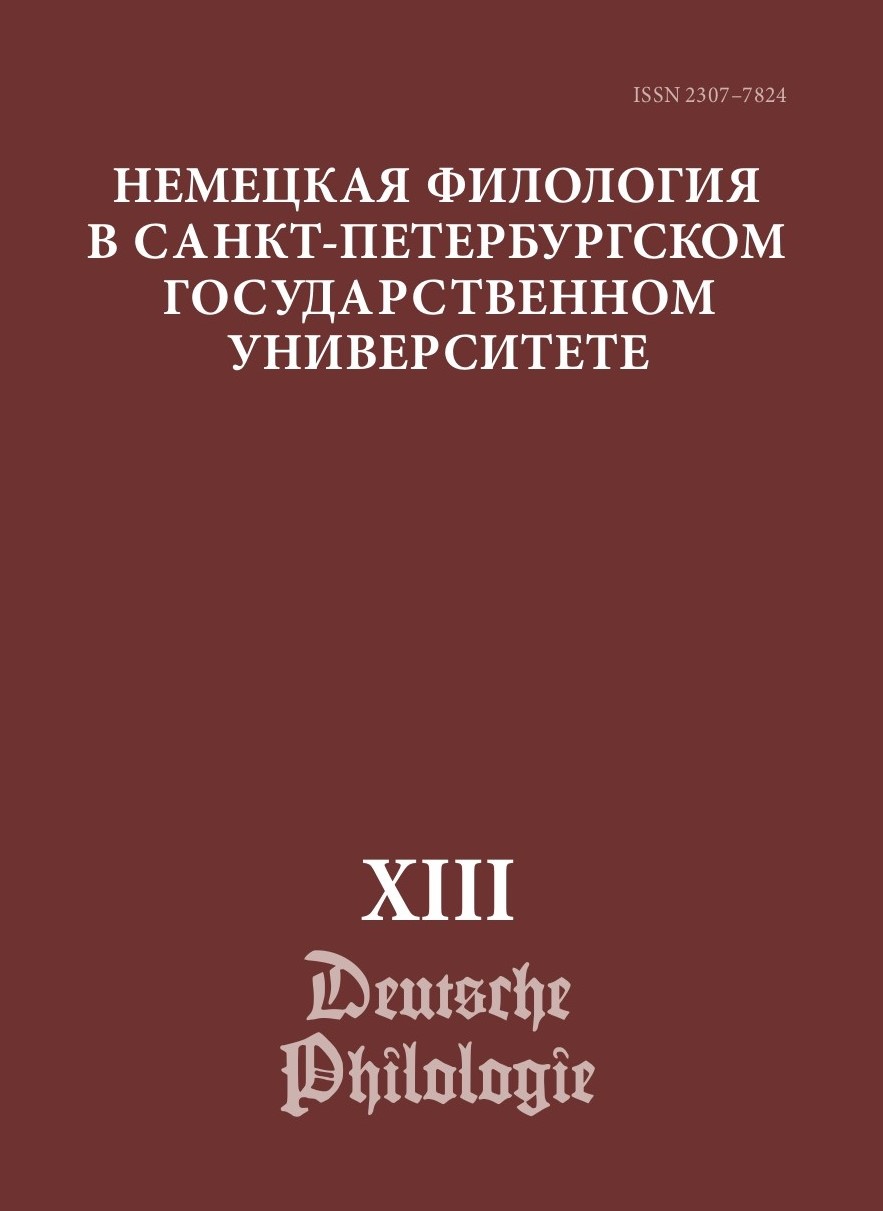LINGUISTIC AND PRAGMATIC ASPECTS OF THE POLITENESS CATEGORY IN CHESS LITERATURE (in German and Russian languages)
DOI:
https://doi.org/10.21638/spbu33.2023.104Abstract
The article studies linguistic expression of politeness and its pragmatic value in chess literature, focusing on works by Z. Tarrash, A. Nimzowitsch and A. Alekhine. In the beginning of the 20th century, authors of books on chess aimed at popularizing the game among amateurs, as well as engaging in arguments with other chess players. Accordingly, the studied texts represent a number of techniques for expressing politeness towards the reader and towards the players whose games are analyzed. Politeness in regard to a participant of a game can be expressed by a compliment in relation to a strong move, as well as in “polite surprise” at a bad decision taken by a strong chess player. Politeness towards the reader includes direct address, sometimes using ritual formulas, unobtrusive advice, and various techniques of authorial distancing as an indicator of modesty. A method specific to chess literature is referring to the participants of a game as Weiß/белые (‘white’) and Schwarz/черные (‘black’), even if one of the sides is the author of the commentary. Another way is using plural pronouns instead of singular, which is characteristic of the scientific style. In Russian texts, there are also cases of distancing through the use of impersonal constructions. The pragmatic purpose of politeness in relation to the reader is most likely winning them over, while politeness towards chess players can serve various purposes.
Keywords:
chess, specialized text, educational literature, politeness, linguistic pragmatics
Downloads
References
Литература
Журавлева И. Н. Структурная модель шахматных терминов в русском языке // Филологические науки. Вопросы теории и практики. 2021. Т. 14. Вып. 10. С. 3170–3179.
Журавлева И. Н., Влавацкая М. В. Структурная модель шахматных терминов в английском языке // Мир науки, культуры, образования. 2021. № 2 (87). С. 534–539.
Иссерс О. С. Коммуникативные стратегии и тактики русской речи. 3-е изд. М.: УРСС, 2003. 284 с. * Признан Минюстом РФ иностранным агентом.
Кириллова Ю. Н. Концептуальная сфера «Спорт» как источник метафорической экспансии (на материале немецких печатных СМИ) // Мир науки, культуры, образования. 2010. № 6 (25). С. 52–56.
Пьянов Н. А. Языковая репрезентация понятия игры в словаре и тексте (на материале немецкого языка) // Вестник Хакасского государственного университета им. Н. Ф. Катанова. 2017. № 21. С. 101–104.
Скребцова Т. Г. Лингвистика дискурса; структура, семантика, прагматика. Курс лекций. М.: Издательский дом ЯСК, 2020. 312 с.
Соссюр Ф. Труды по языкознанию / пер. с фр. под ред. А. А. Холодовича. М.: Прогресс, 1977. 696 с.
Филиппов А. К. Шахматная нотация в поликодовом тексте (на материале немецкого языка) // Немецкая филология в Санкт-Петербургском государственном университете. 2022. Вып. 12. С. 160–173. https://doi.org/10.21638/spbu33.2022.108
Филиппов К. А. Немецкие местоимения (размышления о статусе, функциях и перспективах изучения). СПб.: Факультет филологии и искусств СПбГУ, 2008. 24 с.
Филиппова Н. Б. К вопросу о шахматной метафоре в языкознании (на примере работ Фердинанда де Соссюра и других ученых) // Материалы XL Международной филологической конференции. Вып. 15: Грамматика (романо-германский цикл). 4–8 апреля 2011 г., Санкт-Петербург. СПб.: Филологический факультет СПбГУ, 2011. С. 124–128.
Karayev A. A. Specifics of chess terminology // Наука, техника и образование. 2016. № 6 (24). Иваново: Олимп. С. 102–105.
Leech G. N. Principles of Pragmatics. London: Longman, 1983. 264 p.
Weinrich H. Textgrammatik der deutschen Sprache: 2. Aufl. Hildesheim; Zürich, New York, 2003. 1111 S.
References
Filippov A. K. Chess notation in a polycode text (based on the German language). German Philology in St. Petersburg State University, 2022, iss. 12, pp. 160–173. https://doi.org/10.21638/spbu33.2022.108 (In Russian)
Filippov K. A. German pronouns (reflections on the status, functions and perspectives of study). St. Petersburg: Faculty of Philology and Arts of St. Petersburg State University Publ., 2008. 24 p. (In Russian)
Filippova N. B. On chess metaphor in linguistics (as exemplified by the works of Ferdinand de Saussure and other scholars). Materialy XL Mezhdunarodnoi filologicheskoi konferentsii. Vyp. 15: Grammatika (romano-germanskii tsikl). 4–8 aprelia 2011 g., Sankt-Peterburg. St. Petersburg, Philological Faculty of St. Petersburg University Press, 2011, pp. 124–128. (In Russian)
Issers O. S. Communicative strategies and tactics of Russian speech, 3rd ed. Moscow, URSS Publ., 2003. 284 p. (In Russian)
Karayev A. A. Specifics of chess terminology. Nauka, tekhnika i obrazovanie, 2016, no. 6 (24), pp. 102–105.
Kirillova Iu. N. Conceptual sphere “Sport” as a source of metaphorical expansion (based on the German printed media). Mir nauki, ku’tury, obrazovaniia, 2010, no. 6 (25), pp. 52–56. (In Russian) Leech G. N. Principles of Pragmatics. London: Longman, 1983. 264 p.
P’ianov N. A. Verbal representation of the concept “game” in a dictionary and in a text (based on the German language). Vestnik Khakasskogo gosudarstvennogo universiteta im. N. F. Katanova, 2017, no. 21, pp. 101–104. (In Russian)
Saussure F. Works on linguistics, transl. from French, ed. by A. A. Kholodovich. Moscow, Progress Publ., 1977, 696 p. (In Russian)
Skrebtsova T. G. Discourse linguistics: Structure, semantics, pragmatics. A lecture course. Moscow, Izdatel’skii Dom IaSK Publ., 2020. 312 p. (In Russian)
Weinrich H. Textgrammatik der deutschen Sprache: 2. Aufl. Hildesheim; Zürich, New York, 2003. 1111 S.
Zhuravleva I. N. Structural Model of Chess Terms in the Russian Language. Philology. Theory & Practice, 2021, vol. 14, iss. 10, pp. 3170–3179. (In Russian)
Zhuravleva I. N., Vlavatskaia M. V. Structural model of chess terms in English. Mir nauki, kul’tury, obrazovaniia, 2021, no. 2 (87), pp. 534–539. (In Russian)
Downloads
Published
How to Cite
Issue
Section
License
Условия передачи авторских прав на статьи и рецензии, опубликованные в ежегодном периодическом издании «Немецкая филология» регулируются условиями Лицензионного Договора автора с Санкт-Петербургским государственным университетом. В соответствии с Лицензионным Договором опубликованные материалы находятся в открытом доступе, а авторам бесплатно предоставляется неограниченные возможности их распространения и самостоятельного архивирования.




